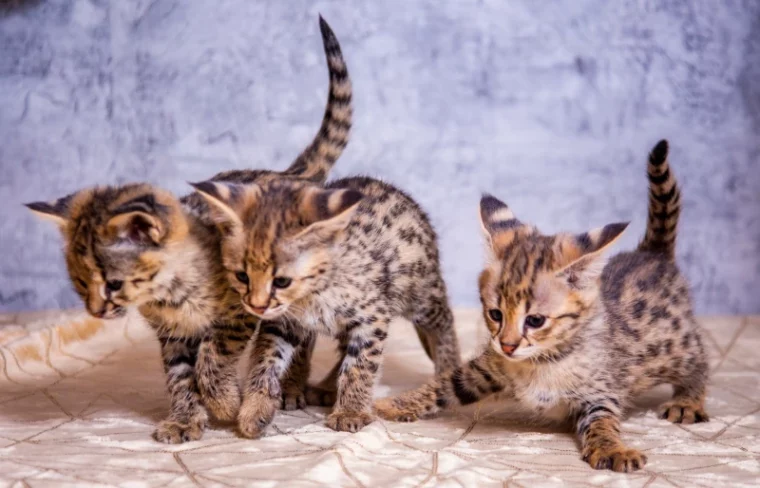
Click to Skip Ahead
If you love wild cats, the closest you can get to owning one is with a Savannah Cat.
These cats have a wild appearance and typically have a black, brown, or black spotted coat, with the most common appearance being a light cream coat with solid black or brown spots. That said, they are fully domestic animals, love attention, and typically do well with large families. You can expect a Savannah cat to have an average lifespan of 12-15 years.
Read on below to find out more about the Savannah cat’s lifespan.
What’s the Average Lifespan of a Savannah Cat?
Savannah cats have a longer average lifespan than many other domestic cats and can live until they are 20. However, their average lifespan is about 12–15 years.
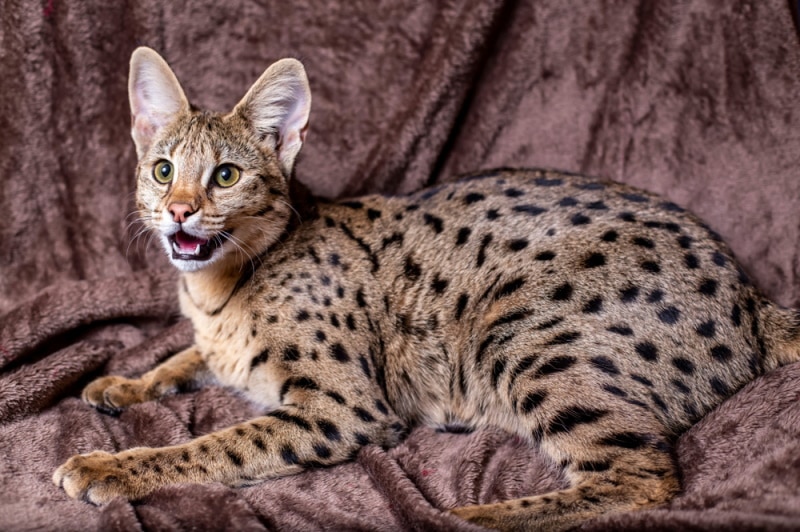
Why Do Some Savanna Cats Live Longer Than Others?
Cats are family members and it’s in our best interest for them to live longer. Some factors such as diet, healthcare, environment, and breeding history can affect how long they live.
1. Diet
Just like in humans, the saying “you are what you eat” applies to cats too. If you expose your cat to a high-quality, balanced diet that is age-appropriate, it will live longer. The diet should vary according to your cat’s lifestyle and health needs. But generally, you should aim for a fresh and organic diet and avoid overfeeding or underfeeding them.
Many cats also don’t drink enough water directly; instead, they consume much of their water through food. If your cat is consuming only dry foods and not taking in enough water, consider switching it to wet food and ensure they are well hydrated.
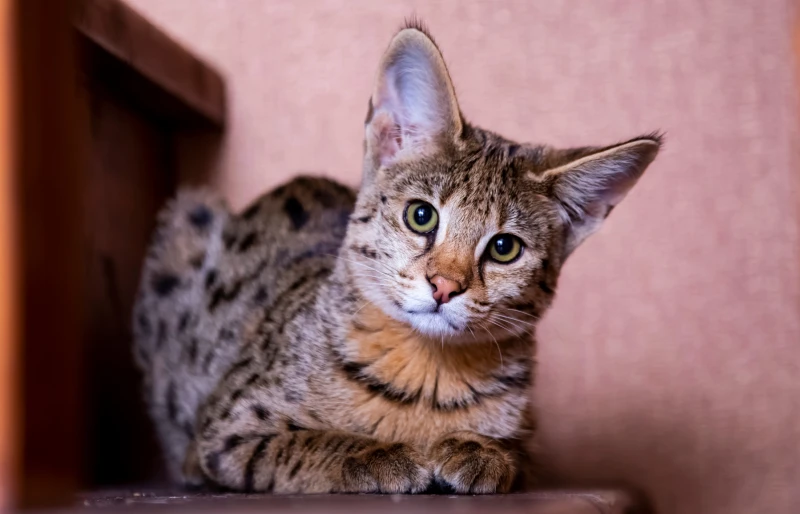
2. Healthcare
Regular vet visits are vital if you want your cat to live longer. Cats typically disguise pain and you might not notice when they are sick or injured, which could accelerate the condition before you notice it. Keeping up with vet visits will help you identify serious health concerns before they become life-threatening.
3. Living Quarters
Indoor cats tend to live longer than outdoor cats. Living outdoors exposes your cat to infectious diseases, pesticides, aggressive animals, and car accidents. Outdoor cats have an average lifespan of several years shorter than indoor cats. A big enclosure also allows your cat to move around and exercise, which improves their physical health.

4. Size and Weight
According to the Association for Pet Obesity Prevention, over 60% of domesticated cats suffer from obesity. Obesity in cats leads to serious strain on their body, which can cause muscle strains, heart failure, and joint problems. It can also lead to type 2 diabetes. Underweight cats can also develop cancer, kidney disease, and other health conditions. A quick trip to the vet clinic can help you determine whether your cat has a healthy weight and size.
5. Environment and Conditions
Boredom and stress can shorten your cat’s lifespan. Creating a conducive and enjoyable environment for your cat includes providing them with engaging toys like a scratching post and a safe playground. Savannah cats are also quite social—increasing your bonding time or getting another cat is a fun way to entertain them.
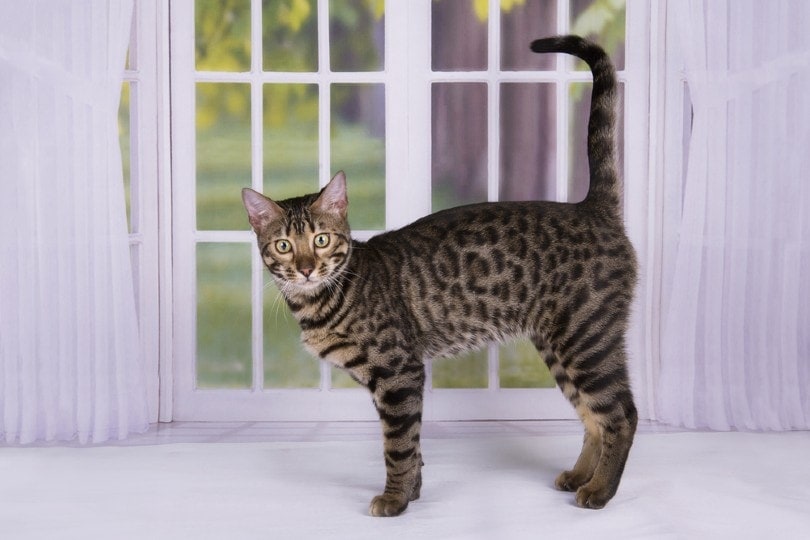
6. Sex
Female cats live 2 years longer than male cats on average. Cats who are spayed or neutered also live longer than those that are not. Spaying and neutering your cat reduces the risk of certain illnesses.
7. Breeding History and Genetics
According to a recent UK study1, purebred cats live shorter than mixed-breed cats. Genetic diversity in mixed breeds reduces their risk of developing some hereditary diseases. However, purebred Savannah cats have a longer lifespan and can live for up to 20 years.

The 5 Life Stages of a Savannah Cat
1. Newborn
Savannah cats stay in the newborn stage for 8 weeks. Savannah kittens are born blind and fully depend on their mothers during this stage. They also go through a lot of physical and physical development during this stage.

2. Kitten
A Savanna kitten changes how it looks and acts 8 weeks after birth. Its eyes open during this time, and it can hear. It also develops all its baby teeth and starts being curious and mobile during this stage. A Savannah cat will stay in the kitten stage until they are 12 to 16 months old.
3. Adult
A Savannah cat typically stays in the adult stage for about 10 years. They are active during this stage and will remain energetic throughout if their health conditions are met. Maintaining communication with your vet is important since most Savannah cats will start experiencing minor health issues during this stage.
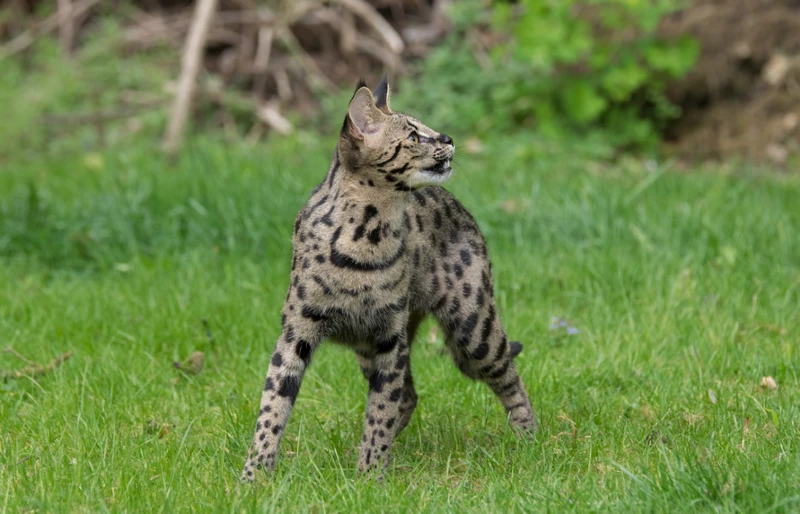
4. Senior
Savannah cats can live for several years after they pass the adult stage. They are less active during this stage, and their health can start failing. Senior Savannah cats can also need help with grooming.
5. Geriatric
Some Savannah cats can reach this stage with no signs of slowing down. However, some might sleep all day and become far less active. They need to be monitored more frequently during this stage.
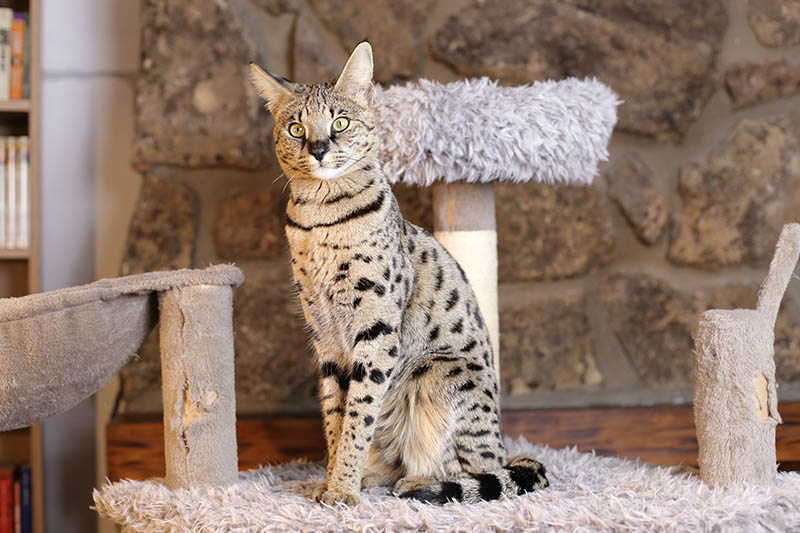
How to Tell Your Savannah Cat’s Age
It’s vital to be able to tell your cat’s age; not only does it enable you to give it the right diet, but it also helps prevent medical conditions that come with age. There are several ways you can identify your Savannah cat’s age. The most efficient way of telling your Savannah cat’s age is by taking it to a veterinarian.
You can also check the weight, teeth, and eyes. Young cats between around 1 to 2 years have less tartar buildup on their teeth and will usually gain weight until they are 3 years old. Senior cats also lose the ability to self-groom and might develop arthritis, diabetes, and blindness.
Conclusion
A well-cared-for Savannah cat can live for up to 20 years. These cats are quite intelligent and thrive in a stimulating and social environment. They can figure out how to open doors and cabinets and get quite naughty if their behavior goes unchecked. Their large size, high energy levels, and charm of a domestic cat make them perfect for large families, especially those with small children.
Featured Image Credit: Kolomenskaya Kseniya, Shutterstock







